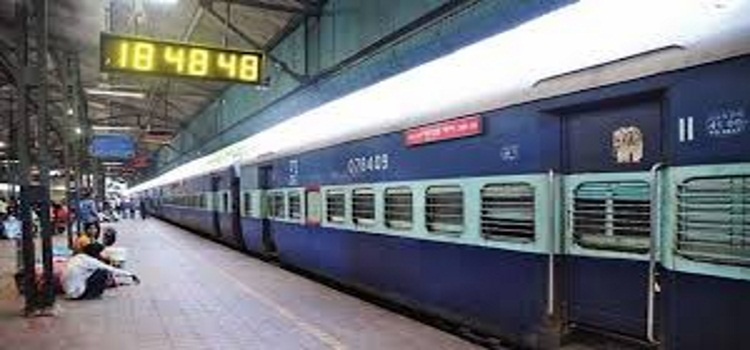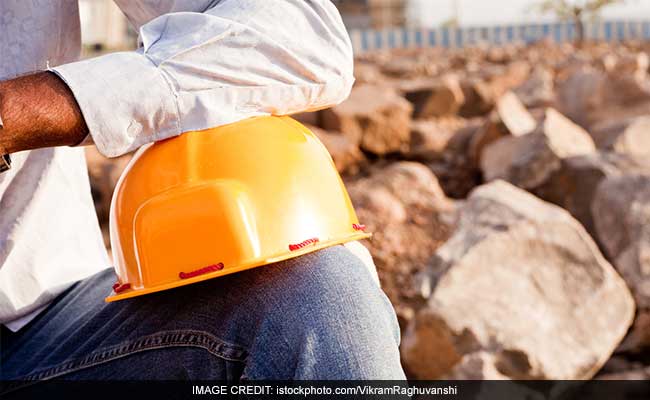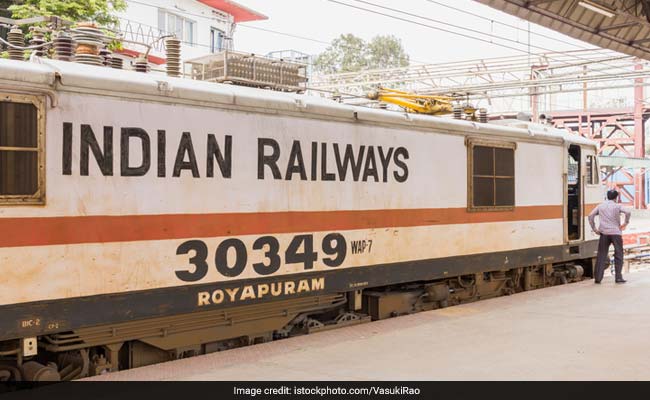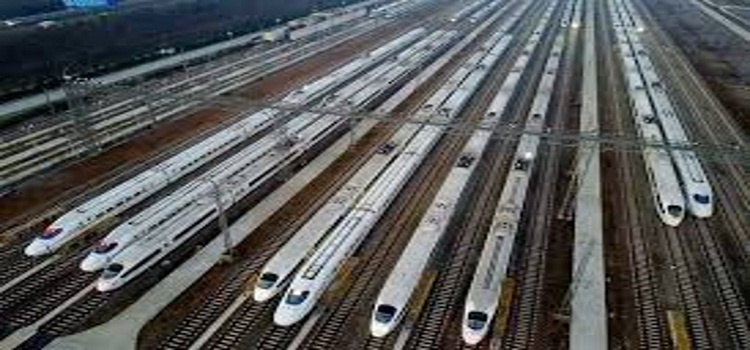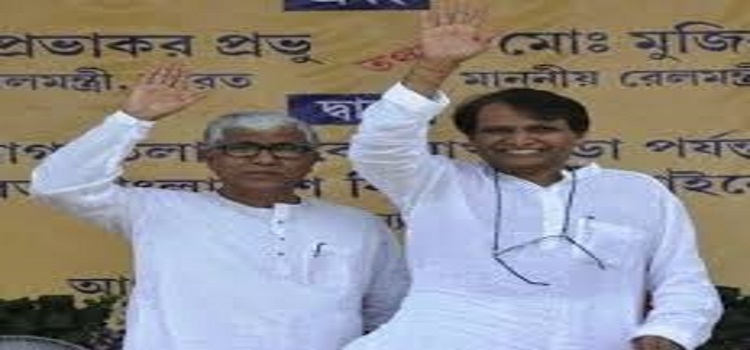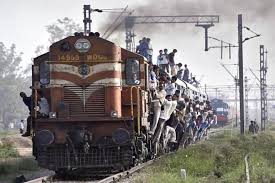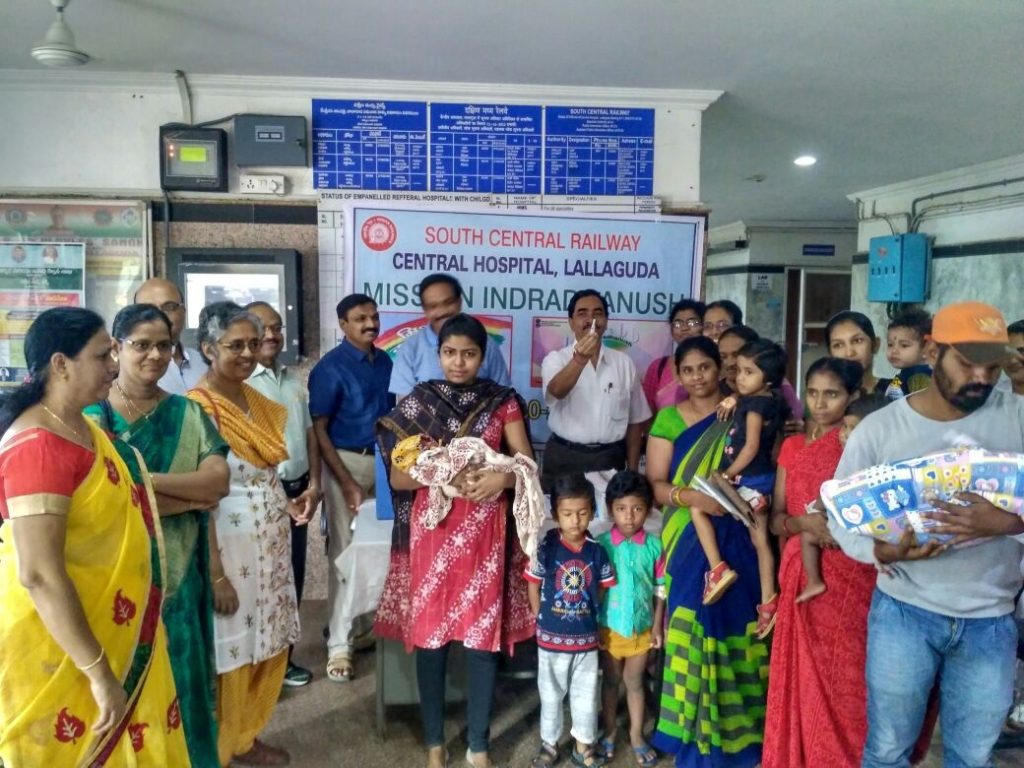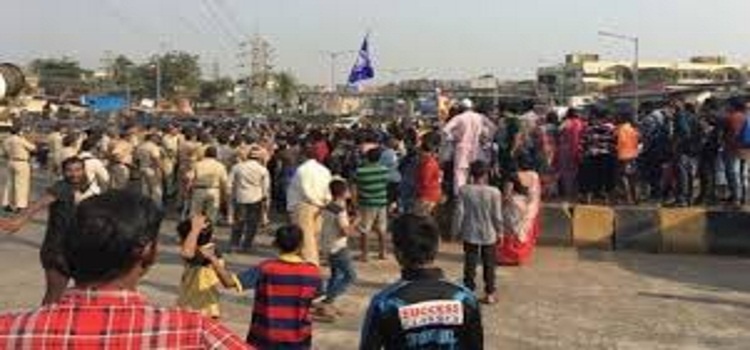
Commuters in Mumbai have felt the impact of the Maharashtra bandh called for by Dalit activists. The extent of the impact though varies from location to location. Bharipa Bahujan Mahasangh leader Prakash Ambedkar called off Maharashtra bandh after a day of unrest at 4pm on Wednesday. This is the update at 5pm.
As many as 170 local train services were cancelled and 1,020 were delayed following ‘rail roko’ protests in different parts of the city as part of the protests by Dalit groups Wednesday.
As protesters gathered and blocked railway tracks at various stations, such as Palghar, Virar, Nalasopara, Dahisar, Malad, Goregaon, Andheri, Mahim, Dadar and Elphinstone Road along the Western Railway, as many as 60 services were cancelled and more than 200 trains were running late from 8 am to 4.30 pm.
“However, efforts were made to provide local trains at regular intervals of every 5 to 10 minutes during peak hours and throughout the day,” read a statement issued by the Western Railway.
As the protests picked up by afternoon, services of the newly-launched AC local were also discontinued owing to safety concerns. “Four services of air-conditioned local train, scheduled in the morning hours were operated as per the time table but afterwards looking to the crucial situation and to ensure safety of newly introduced AC local train as well as of commuters, the rake of AC local train was withdrawn in Mumbai Central Carshed and remaining eight services of this train were cancelled,” the release stated.
There was joint deployment of police, Government Railway Police (GRP) and Railway Protection Force (RPF) on suburban and main lines. “Preventive arrests/ detention were made by GRP/Police with assistance of RPF while removing protesters from the station premises/ track. GRP is registering cases under the Bombay Police Act and provision of IPC… RPF has registered 13 cases under Railway Act of nuisance, obstructing train running against unknown persons in mob of protesters. The offenders will be identified by RPF on the basis of videography of protests and CCTV footage,” added the release.
Meanwhile, 110 suburban services were cancelled on the central line and the remaining 820 trains were delayed by about 20-25 minutes. However, 30 special services were run through the day. Services were disrupted intermittently at Thane, Diwa, Titwala, Vasind and Ghatkopar stations and all obstructions were cleared only by 4 pm.
Meanwhile, both up and down services on the harbour line were also disrupted in the morning due to an agitation at Govandi. According to officials, the services were disrupted 12 times through the day at various stations and 13 cases were registered by the RPF, three of which were filed for the agitation at Goregaon station.
The officials faced a tough time convincing protesters to get off the tracks. “We will conduct an inquiry and check the CCTV footage. There has also been a lot of damage to the railway property during the protests,” said Anup Shukla, Divisional Security Commissioner, RPF, WR.
The station master at Mulund railway station said the last down local that left from Mulund was at 11.30 am after which the next train came at 3 pm.
“The fast down line was operating on the central line as it did not halt at Kanjurmarg where protesters had taken to the tracks. However, soon, there were limited trains on the fast line as well. By 3 pm, however, the Central Railway started limping back to normalcy on both up and down directions,” said the station master. Railway platforms across the central line were choc-a-bloc with commuters who had no other option but to wait for the next train as protesters had blocked various roads too.
A senior GRP officer said they followed a three-pronged strategy while dealing with the protesters. “Some of them told us that they just wanted to be on the tracks for 5-10 minutes, click photos and leave. In some cases, we reasoned with the protesters to get off the tracks since they were causing problems to students going for their exams and people who were in emergency situations. In the extreme cases, we threatened them of lathi-charge and told them we would arrest them if they did not get off the tracks,” he added.
The official said the central line was the worst hit. “There were protesters who had blocked the railway lines at Ghatkopar and Kanjurmarg. At Kanjurmarg railway station, they also threw the steel benches on the railway lines. We are in the process of identifying those who damaged public property after which FIRs will be registered,” he said.
Pallavi Lokhande, who was travelling from Kandivali to Churchgate, said, “Since these protesters are disrupting rail services, there isn’t much that the Railways can do to prevent it. But they could at least keep the commuters informed. There was a long disruption at Goregaon station but there was no announcement… When they knew there was a disruption ahead, they should have warned us and we would not have taken the train. So many commuters got down onto the tracks and walked back to the station.”
Suresh Kumar, a Goregaon resident, said, “I was expected to report to work today in Andheri. But when I reached the station, I saw the protesters and returned home out of fear.”
1. Central Railway: After smooth functioning of trains on Central, Western and Harbour Lines this morning, activists staged a rail roko at Thane station for close to ten minutes at 7:45am. Services resumed soon after. There were protests at Diwa, Titwala and Vasind railway stations also that led to delay in services. The suburban train services on Central Railway, Mumbai Division’s Main line and Transharbour line are running uninterrupted except for few minutes. Railway staff, RPF and GRP officials are deployed on the station to clear the path and train services have now resumed unhindered. Due to this agitation, central railway trains are running 10-20 minutes. Personnel are on the job to streamline services on Central Railway suburban services.
2. Harbour Line: Services on the Harbour line were hit post 11:20am. Reports suggest that protesters have staged a rail roko at Govandi station leading to disruption of train services on the harbour line. The service resumed at 11:40am. The Dahanu local scheduled to leave at 11:18am was stopped at Virar. Juinagar and Nerul stations have also reported some disruptions.Harbour line paths cleared and services restored.
3. Western Railway: Similar protests and disruptions were reported from Virar, Goregaon, Andheri, Elphinstone Road station on the western line. Trains are delayed by over 20 minutes as a result. Large number of protestors occupied the railway tracks at Nallasopara Station from about 9.55 hrs, disrupting rail traffic. Administration and Security Forces deployed to normalise the train operations. Railway tracks were evacuated and train operations resumed at Nallasopara/Virar from 10.30 hrs. Some protesters also disrupted dispatch and reception of suburban trains at Virar. Tracks were evacuated of protesters and train operations resumed at Virar and Goregaon from 9.05 hrs on WR suburban.
After four trips of AC local in the morning, remaining eight services of AC local suspended for the day in view of protests. AC local rake is withdrawn in BCT carshed. Other suburban services are being run amid intermittent protests at Elphinstone Rd, Goregaon, Andheri, Dadar, Malad. There is no cancellation of long distance trains.
By 5pm, local train services resumed on WR and CR section in Mumbai. Western Railway: Suburban and Long Distance services are running on all lines. Efforts being made to provide local trains at regular interval/every 10 mins during evening peak hours. Administration and Security Forces on alert and monitoring the situation. WR is geared up to run all services during evening peak hours as per regular time table for commuters to safely reach their destinations. Addl Security Staff deployed at stations. All lines are working. We wish safe journey to our commuters.
4. Central Railway: All paths clear on Central Railway. Services are being normalised. No need to panic… we are committed to ensure smooth operations of trains.
5. Goregaon : From 12.05 to 12..15 hrs traffic disrupted on Goregaon station. Disruption expected at Malad and security arrangements are there. In fact, 2000-3000 protesters are moving from Andheri to Goregaon in city area and they are again and again expected to move on railway track. Goregaon Up Local Line stopped from 13.38 hrs.
Bhayandar up local line train stopped from 13.58 hrs to 14.16 hrs, Goregaon DN local line stopped from 14.03 hrs to 14.20 hrs, DN through line train Bhayandar stopped 14.11 hrs Palghar protest began at 13.50 hrs blocking up and DN main line. Trains detained at various stations A) 93016 AT PLG, B) 93018 AT BOR, C) 22956 AT VGN.
6. Dadar: DN local Borivali stopped at 12.50 hrs started at 13.18 hrs, UP local Andheri – Churchgate stopped at 12.40 hrs started at 13.16 hrs.
7. Mahim Junction: DN Harbour wadala stopped outside Mahim at 13.08 hrs and started at 13.12 hours. Malad: DN local Borivali stopped from 12.44 to 12.52 hrs.
8. Mumbai Metro: At 11:30am services on the Mumbai Metro were also impacted. Services between Ghatkopar and Airport were impacted. By 5pm, Metro services from Versova to Ghatkopar resumed to normal.
9. BEST Buses, Thane Municipal Transport buses: 48 BEST Buses damaged due to stone pelting. Rasta roko at Bandra Kalanagar, Dharavi Kumbharwada, Kamraj Nagar, Santoshnagar Dindoshi, Hanuman Nagar Kandivali due to which road traffic affected. Police is deployed on railway station and on roads to control the situation.
10. Kalanagar Junction, Bandra: Commuters are advised to avoid Kalanagar and MMRDA Junction for some time due to Rasta roko. Rasta roko at kalanagar junction, Bandra, Dahisar, Akurli bridge, Kandivli, Panvel, Ghatkopar, Sakinaka road near Jagruti Nagar metro station.
11. Traffic situation in Western Suburbs: Agitations and morchas are observed on the streets due to which there is diversions, areas effected include Akurli bridge (Kandivali), Charkop (Kandivali West), Borivali, Dindoshi near santosh nagar, Kamraj nagar (Vikroli), Kherwadi jun. (BKC) at sai prasad hotel, MIDC near Vijay nagar (Jogeshwari), Arunkumar Vaidya Marg (Dindoshi), Kumbharwada Jun (Mahim), Oshiwara. Stone pelting incidents on JVLR near Powai on private cars.
12. Traffic situation in Central suburbs: In thane west, Thane Municipal Transport buses and autos are being shut by dalit activists. Only State Transport buses are playing. All shops except medical shops are shut. Young girls are also participating in enforcing the bandh. They stop autos plying with passengers and requested them to stop. Close to 500 protesters organised a bike rally in Thane. There are traffic diversions in Ghakopar, Thane, Kanjurmarg, Bhandup, Chembur, Mulund and Sion.
13. Autorickshaws, taxis, app-based cabs: Regular commuters found the roads relatively empty this morning and twitter was abuzz with discussions on how many made it to office in record time. Trains also saw fewer commuters compared to most days during rush hour. But many auto-rickshaw drivers were apprehensive of venturing long distances. Taxis too were cautious given the scale of damage witnessed yesterday with respect to autos and BEST buses. Many commuters took to twitter to complain about non-availability of app-based cabs as well as surge pricing.
14. Airport: Passengers are advised to report well in time for the flights keeping in mind possible hold-ups and roadblocks along the way.
Domestic carriers, including the government-owned Air India, have waived charges for ticket cancellations and no-show due to the ongoing unrest in parts of Maharashtra. Air India said it will not charge any fee for cancellation of tickets or rescheduling of a journey to/from Mumbai on January 2 and 3. Air India has decided to waive ticket cancellation/ rescheduling charges for its flights to and from Mumbai for today and tomorrow, a senior airline official said.
Bharipa Bahujan Mahasangh (BBM) leader Prakash Ambedkar has called for a `Maharashtra bandh’ to protest the state government’s “failure” to stop the violence at Bhima Koregaon village in Pune district. The event to mark 200th anniversary of the Bhima Koregaon battle in Pune district, in which forces of the East India Company defeated Peshwa’s army, was marred by incidents of violence in which one person was killed.
